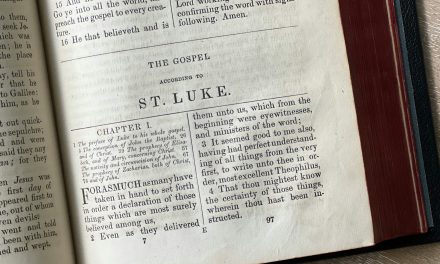How’s Your Walk?
Psalms 119:101 ESV I hold back my feet from every evil way, in order to keep your word.
A repentant sinner will hunger and thirst for righteousness (Matthew 5:6). David, our elder brother in the faith, confesses his heart’s desire to obey God’s righteous precepts when he says he holds back his feet from every evil way. The ultimate end of godly discipline is to be pleasing to the Lord (1 John 3:22) and enjoy the peace that accompanies keeping His word. When the endgame is righteousness, God’s commandments are not burdensome. May we all strive for righteousness for God’s sake!
David says “I hold back my feet from every evil way.” This language produces a few illustrations which are worth mentioning. First, this proclamation is written in the first person. “I” hold back my feet is a statement of personal discipline on the part of brother David. Always reliant on the grace of God, (Psalm 119:32), David nevertheless works out his own salvation with fear and trembling (Philippians 2:12). Men and women of God ought to have regular practices of godly discipline to aid in the battle with sin. Secondly, David holds back his feet. We are reminded that we are walking with the Lord every day. It is a good thing to make commitments to righteous living in our hearts, but the man who keeps his feet from taking him in the wrong direction (Psalm 119:59) will do well in reaching his goals.
Finally, David’s repentance and commitment to goodness are complete. He holds back his feet from every evil way. God’s children not only abandon big bad sins, but they want to be rid of even respectable sins. There is no sin so small that Christ wasn’t crushed for it in your place. Thus, no evil way exists from which we may not hold back our feet. Thanks be to God for Jesus who fully fulfilled this verse on our behalf.
The Good Teacher
Psalms 119:102 ESV I do not turn aside from your rules, for you have taught me.
Having held back his feet from every evil way, our psalmist also is careful how he is turned. Our very posture tells us a lot about our hearts. Where are you turned today? Is your body positioned toward God’s rules or are you turned aside from them? Do not depart from God’s rules, dear Christian! “But we are under grace, not law,” you will say to me. Nay, you are under grace so that you may love God’s law. The antinomian says there is no law. But the senseless Christian gives lipservice to God’s law while living like an antinomian, by departing from the law in practice.
From where does our strength come for the day of battle? It is the Lord who has taught us His rules. Not only has he told us his rules, but Jesus came in the flesh and taught us by example. The disciple whom Jesus loved wrote, “whoever says he abides in him ought to walk in the same way in which he walked” (1 John 2:6). Unlike the teachers whose wisdom we may surpass by our own careful study of the Word (Psalm 119:99), the Lord Jesus is the ultimate good teacher (Luke 18:18). How can we desert his rules? How can we do anything but honestly ask What Would Jesus Have Us Do? We are indebted to Him and his life is an example to us in every respect (1 Peter 2:21) because he was tempted yet without sin (Hebrews 4:15)!
Sweeter Than Honey
Psalms 119:103 ESV How sweet are your words to my taste, sweeter than honey to my mouth!
The man who chews on God’s Word will digest it and get the most nutrients out of it. God has provided us with an abundance of nutritious foods, and he has found it fit to make them good to the taste. One of the most telling stories about humanity is that our federal head ate from the forbidden tree while simultaneously having his pick of every other tree (Genesis 2:16). The best of us wasn’t content with what God had provided.
And herein we see the goodness of God. He has given us something even greater than earthly sweetness to chew on: His Words. Honey is naturally sweet and never goes bad. God’s Word is the greater honey. When we feast upon the scriptures we taste and see that the Lord is good (1 Peter 2:3). Honey is never bitter or sour, and neither is the Bible to the adopted child of God. We taste it, take it within ourselves, and then come back for more. But like honey, it has to be searched for and found, then extracted from its comb. Honey doesn’t come from Heaven in jars. There is danger and peril in taking the fruit of the bee, and we also must be willing to endure trial when we dig into God’s Word. You may even get stung!
Now examine yourself, dear friend. Is Bible reading your habit? Do you find it to be a chore? Would you rather check your notifications or read your favorite blog than open the Word? Why is that? Do you not find it sweet to your taste? Has your affection waned for the God who became man and died on your behalf? Turn back to Him through the sweetness of His Words to your mouth. Man shall not live on bread alone (Matthew 4:4).
Righteous Hate
Psalms 119:104 ESV Through your precepts I get understanding; therefore I hate every false way.
Intersectionality is the vice du jour, but here we see the glorious intersection of righteousness and indignation. The psalmist has already been clear that God’s precepts are the means by which he hopes to have life everlasting and even walk in the ways of Yahweh in this earthly tabernacle. And now see him re-iterate that it is by God’s Word that he gains knowledge and understanding. The man of God must be fully equipped unto all good works (2 Timothy 3:17), and only heartfelt meditation on God’s Word will do that (2 Timothy 3:16). We are called to prove God’s will by being transformed by the Holy Spirit (Romans 12:2). And Jesus said we are sanctified by His Word (John 17:17).
It is the precepts of God that give us discernment so that we can know right from almost right (Hebrews 5:14), and even though discernment isn’t popular today, we are still called to practice it. And this is where good doctrine gets hard to swallow for some. Because he gets understanding through God’s precepts, our psalmist hates every false way. This is language that seems too strong for some, but we are students of the Word so we must examine it honestly and believe it despite our sinful tendency not to.
F irst, we have to admit that there is nothing in the context that limits this hatred of false ways to “Oh, that’s just about David.” Nor do we see any implication that this hate was abhorred by God. This is a righteous hatred, repeated shortly thereafter (Psalm 119:128) and thus, it ought to be imitated. We are children of God and therefore imitators (Ephesians 5:1). Second, our hatred for falsehood is not restricted to a subset. Again, we see the word every is used to describe the scope of the action. We hate every false way. And of course we do! Our dear Savior is the Truth (John 14:6) and He is love. Hating that which is opposed to Jesus is a duty and a pleasure if our hearts are right.
irst, we have to admit that there is nothing in the context that limits this hatred of false ways to “Oh, that’s just about David.” Nor do we see any implication that this hate was abhorred by God. This is a righteous hatred, repeated shortly thereafter (Psalm 119:128) and thus, it ought to be imitated. We are children of God and therefore imitators (Ephesians 5:1). Second, our hatred for falsehood is not restricted to a subset. Again, we see the word every is used to describe the scope of the action. We hate every false way. And of course we do! Our dear Savior is the Truth (John 14:6) and He is love. Hating that which is opposed to Jesus is a duty and a pleasure if our hearts are right.
And finally, if we receive our understanding and knowledge of God through His true precepts, and if we are empowered to walk in His ways of righteousness because of the true way, then we may rightly conclude that false ways lead people to misunderstandings and false knowledge of God. It is a brutal fact that false ways lead people to death, despair, misery, and destruction. What is there to like about them? No reasonable person would praise a sweet-tasting poison for making his loved one happy for a moment if it soon killed him. In the same way, we also hate every false way because of the ultimately destructive impact it has on our fellow man, even if that false way seems sweet for a season.
See all posts in this series
[loop type=”post” taxonomy=”tag” value=”Psalm 119″ format=”clean” orderby=date order=ASC author=same]
[field title-link][/loop]









Robert, thank you very much for the kind words, brother. That sincerely means a lot to me that your spirit…